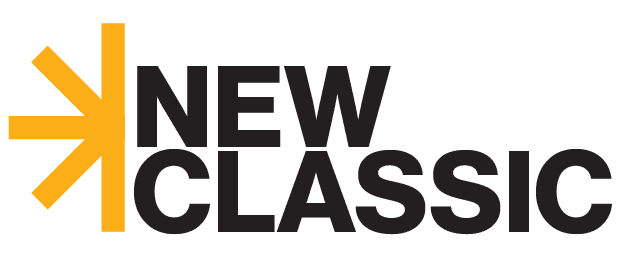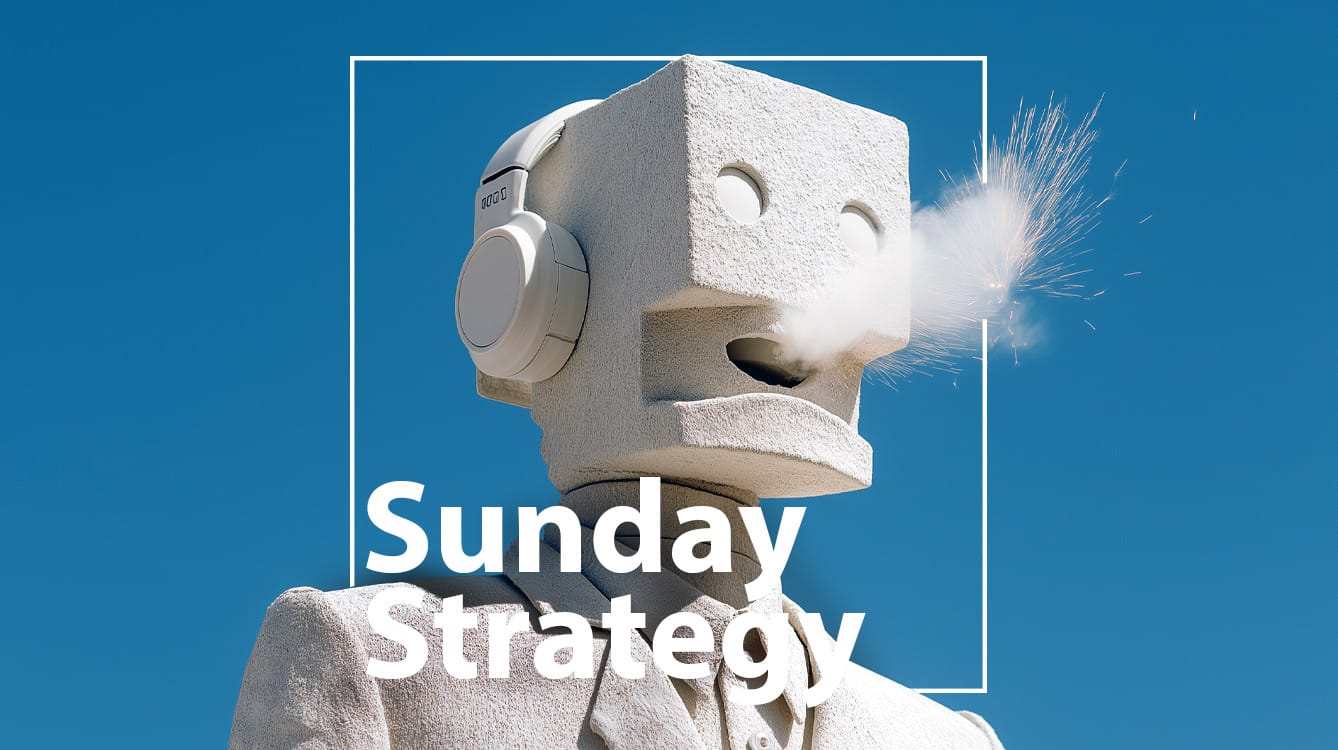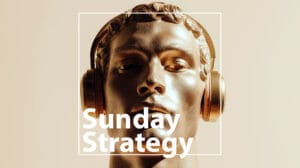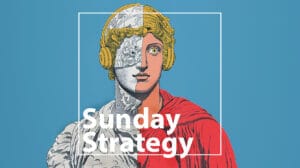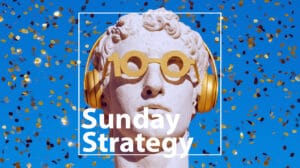In this issue of Sunday Strategy, we look at five stories to think about next week, including: Fake Job Seekers, The Certainty Recession, The White Lotus Effect, AI Tourism Ads and BNPL Festivals.
In addition, we have ads from: Telstra, Tesco Mobile, NoBull, JC Penney and Coca-Cola. If you’d rather listen to this issue, check out our podcast below:
// Five Stories of the Week:
1.) The Robots Are Interviewing For Our Jobs.
Remote jobs have created an unexpected risk in the form of fake employees. CNBC reports a rise in ‘deep fake’ job seekers who use AI to generate fake employment histories and interview using deep fake technology over video. Once employed, they can install malware or ransomware, steal IP or customer data. Gartner predicts by 2028, 1 in 4 job candidates will be fake, implying we’re moving from an age of AI optimised applications to AI applicants.
What will this shift mean for employment? Are we poised to see a shift towards an ‘in person’ application phase? Or are we simply in a moment where fake technology has exceeded detection technology? For today AI employees mean theft, but tomorrow do they mean another way for the ‘over employed’ to expand their jobs?
2.) Navigating the Certainty Recession.
Are we facing a recession? We’re not certain when or if we are, but the lack of any economic certainty is already having a chilling effect on consumer spending and brands. As short news cycles meet long periods of delayed disaster – we’re left trying to find economic indicators amongst worrying stories. The ‘Certainty Recession’ we’re in the midst of, as tariffs are announced, rescinded, delayed, exempted and changed have driven down consumer confidence and left brands paralyzed in how to act.
As consumers simultaneously accelerate spending on certain categories, save in others and begin to raid savings – the only constant for brands is that change is certain. In a polarized economy and culture, no one playbook exists for brands. We need to draw from recession case studies when necessary, but also capture demand where possible. One thing is certain, whether or not a recession is looming – brands have to engage. Uncertainty promotes inaction, but those that engage and adapt with the market and changing consumer behavior can minimize the damage from this period of chaos.
3.) Searching For the ‘White Lotus’ Effect
As the third season of the ‘White Lotus’ wraps up, brands have clambered to build on real or fake associations between brands and the show. While previous seasons have shown there’s a ‘White Lotus’ effect, with Four Seasons locations where the show is filmed seeing significant increases in interest (193% increase in searches from Season 2’s location and a 425% increase in website visits for Season 1’s location) and clothing and luggage brands seeing sales uplifts.
However, how prominent does a brand need to be to get an uplift? What happens when associations aren’t as ideal as planned – as with Coffeemate’s limited edition line and a Pina Colada storyline? Is any publicity good publicity? Or are some brands hoping they stay background characters?
4.) Does AI Benefit or Hinder Tourism Ads?
Brandtech Group have launched AI generated in-flight content for Japan Airlines using Google’s Veo 2 model. The content inspires travellers to think about the potential of what their trip could mean and builds on previous AI fuelled work from destinations like Lithuania. However, as AI creeps further into travel content, are we missing the point? Is realism needed to root content in a destination or is the fantasy AI can sell more compelling for what travel can be?
5.) Buy Now Pay Later – Festival Edition.
As US music festival Coachella kicks off its first of two weekends this week, amongst record heat and iconic performances, one unique feature of this year’s event is how festival goers have paid for it. Billboard reports that 60% of General Admission ticket buyers have used a payment plan, requiring as little as $49.99 up front to buy the $600 tickets. Festival installment plans aren’t new as Coachella launched a plan in 2009 and Reading Festival in the UK has offered the same for longer.
However, in a year featuring economic uncertainty and market chaos, the expense of Coachella (where overall costs of attendance can be over a grand) can seem contradictory for many until financial accessibility measures are taken into account. While it would be tempting to use Coachella and other festivals as an indicator of a ‘U-Shaped’ economy, it’s more accurate to consider how BNPL has helped events continue to sell despite less ability to buy.
// Ads You Might Have Missed:
1.) ‘Wherever We Go’ – Telstra:
Australian telecoms brand Telstra has brought a sense of rural Australian gothic storytelling to its latest business focused ad. Whereas B2B advertising is often stereotyped as dry, even emotive examples often take a realistic approach to highlighting businesses. Telstra challenges this with a story about a shoemaker wandering the Australian countryside, in a fantastical rolling shop – and in the process, touches on some of the wonder and connection of business ownership.
2.) ‘Same But Tesco’ – Tesco Mobile Ireland:
If we all do the same things with our phones, why do we need different mobile networks? Grocer Tesco’s mobile network has a history of being no-nonsense, and at times brutal, with how it looks at the world. Its latest ads in Ireland use cats, and their views of their owner’s phones, to show similar phone usage requires similar networks. For a category where price and features often try to create distinctiveness, Tesco uses its budget positioning to go in an opposite direction – pulling everyone else down to its level in a humorous way.
3.) ‘Yes JCPenney’ – JCPenney:
Finding a deal is worth more than the price you pay, it comes with a sense of accomplishment, discovery or even envy from others. While brands like TK Maxx have championed the search and the find, and brands like Payless have subverted expectations with fake luxury brands – JC Penney has launched a new campaign that focuses on how your deals can make others feel.
In a week where market chaos has made economic envy resonate harder than normal, the US retailer has tapped into how great deals can inspire jealousy or appreciation. Its ‘Airplane’ ad brings to life the brand’s new position by highlighting how a $79 outfit in economy class can inspire jealousy amongst first class passengers. The external focus tackles the negative perceptions of the brand head on, while making the brand less about finding a deal and more about what that deal can do to others – putting it in a distinct space vs. other value brands who operate as ‘bargain bins’.
4.) ‘The Gym is Yours’ – NoBull:
Fitness brands exist in an intriguing spectrum, ranging from celebrating the struggle through to celebrating the good feeling after. For every celebration of fast you find in PUMA, there’s a grit focused Under Armour ad that wants you to bathe in the discomfort.
NoBull’s latest ad is interesting as it tries to split the difference on this scale – using the gym as a vehicle to talk about hard work in a positive way. For a brand built on the grit of Crossfit, does this signal a shift towards wider fitness, on the heels of greater competition in its traditional heritage space?
5.) ‘Classics’ – Coca-Cola:
Very few brands have a heritage worth celebrating widely. This is often a hard pill to swallow, especially as internal brand pride is always greater than consumer engagement. However, for brands like Coca-Cola, its ubiquity offers a compelling chance to look back on its cultural impact.
While cultural heritage is a double edged sword, just look at the blowback to any changes of Coke’s “Holidays are coming” ads – their latest campaign effectively champions where they have shown up in culture. Taking a leaf from Heinz’s previous campaign, where the brand listed its ketchup as an actor in all the famous movie scenes it featured in, “Classics” celebrates mentions of Coca-Cola in famous film scripts. It’s an equity few brands have, so flexing it from time to time feels like a necessary move that also pressures a brand team to continue to build its legacy.
// Sunday Snippets
// Marketing & Advertising //
// Twix launches a “Whatsapp Harmonizer” to autotune bad news [Ads]
// A1 steak sauce hops on US education secretary Linda McMahon’s gaffe mispronouncing ‘AI’ [Ads]
// Schick Hydro Silk says that no matter how awkward a situation is, at least your shave is smooth [Ads]
// Liquid Death partners with a sleep aid to help you ‘Sleep Like The Dead’ [Collab]
// Brian Cox continues on from ASICS in playing against his ‘Logan Roy’ type for Malibu’s latest ad [Ads]
// Stella celebrates those who would cram into a packed bar in beautifully shot photos for ‘Claustrobars’ ads [Ads]
// KitKat calls for a collective phone break by photoshopping phones into KitKats in their latest ads [Ads]
// John Lewis celebrates the ‘finalized divorce’ in a surprising, for Middle England, TikTok [Social Media]
// Guinness celebrates a lovely day with people across all 50 states in their latest US ad [Ads]
// Michelob Ultra launches an app to help runners find shady routes for summer [Ads]
// Sprite is launching an alco-pop with Absolut [Product]
// San Pellegrino is launching a US campaign reuniting Sopranos cast members [Ads]
// Chipotle leans into talk of their ‘amazing forks’ with fork collection [Product]
// Technology & Media //
// Do LLMs process information in a way similar to dyslexics? [AI]
// A website fights the attention economy by only being online for 3 hours a day [Media]
// Meta releases new insights into Gen Z and media [Research]
// Looking at our relationship with Zoom, five years on from the pandemic [Technology]
// The launch of Printemps in New York has seen the department store champion an analog experience [Retail]
// GWI has launched their 2025 social media report [Research]
// NSFW AIs are spilling user’s secrets across the web [AI]
// DoorDash is expanding robot delivery [Technology]
// Direwolves have been made ‘de-extinct’ thanks to new technology [Science]
// OpenAI prepares to launch GPT 4.1 [AI]
// The Revenge of the Niche Fashion Magazine [Media]
// A new video rental store is popping up in Brooklyn [Media]
// Life & Culture //
// Dating apps are shifting more in person to cater to younger daters [Romance]
// The Art Basel 2025 ‘Art Market’ report has launched, showing a tougher upscale art market [Culture]
// It’s probably going to take more than color psychology to fix RTO, but it couldn’t hurt [Work]
// Patrons, not fans: Inside the language rules for the Masters golf tournament [Sports]
// Its official, Pets can make you just as happy as a partner [Pets]
// Trader Joe’s Easter ‘mini-totes’ have sparked a second hand buying craze [Fashion]
// A highrise apartment building in New York is giving tenants an allowance to socialize with neighbors [Culture]
// Is Ozempic the reason Americans are snacking less [Food]
// Until Next Sunday
As always, let me know what you think by email (dubose@newclassic.agency), website or on LinkedIn.You can also listen to an audio summary and discussion of each week’s newsletter on Spotify. We’re also on TikTok!
